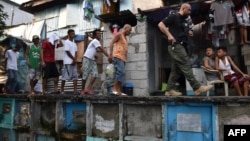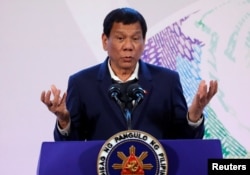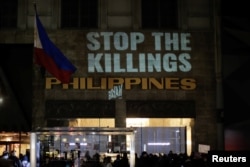A decision by the Philippines this month to withdraw from the International Criminal Court has sparked suspicion that officials in Manila want to squelch a probe into the president’s deadly anti-drug campaign.
Philippine President Rodrigo Duterte moved last week to withdraw from the statute that allowed the court to be founded, his office and the court said in separate statements. The court that was set up in 2002 is known for prosecuting acts such as genocide and war crimes.
It had started a “preliminary examination” into complaints about the Duterte government’s “war on drugs,” his spokesman said Thursday in a statement on the presidential office website.
Duterte’s two-year-old anti-drug campaign has killed thousands at the hands of police, human rights advocates say. Reports of those killings drew criticism from Western countries in 2016 and 2017, but Duterte enjoys popular support at home over perceptions that his effort is reducing everyday crime in the Southeast Asian country.
Quitting the court after seven years raises suspicion that Duterte wants to keep his drug campaign out of the international spotlight, scholars in the Philippines believe.
“It hasn’t taken off yet and all of a sudden there’s this move to withdraw,” said Jay Batongbacal, a University of the Philippines law and international maritime affairs professor. “It seems like an emotionally driven decision.”
Authority to prosecute
The court, based in The Hague, has indicted 39 world leaders to date, all from Africa. It has not investigated crimes in the Philippines.
Philippine courts, not the international one, should hear any complaints related to the anti-drug campaign, presidential spokesman Harry Roque said Thursday in explaining the move for withdrawal. Local courts are willing to take related cases, Roque said, so for the international body to do the same violates a “principle of complementarity.”
The Philippine withdrawal would hand the court “a big loss” by discouraging other Asian countries from joining, Roque added.
But skeptics worry that Duterte is pulling out to vent about the investigation. The court announced February 8 a “preliminary examination” into any “extra-judicial killings in the course of police anti-drug operations.”
The anti-drug campaign has killed 12,000 suspects, the New York-based advocacy group Human Rights Watch said in January. “Duterte has responded to increased criticism of his anti-drug campaign by impugning, harassing, and threatening critics of the government and human rights defenders,” the advocacy group says.
Duterte reassigned the Philippine National Police to the campaign in December after a break in mid-2017. The deaths of three young drug suspects had stoked public outrage then, and Duterte briefly put the country’s Drug Enforcement Agency in charge.
Before taking office in 2016, Duterte pledged to eradicate illegal drugs.
The Philippine Drug Enforcement Agency said in February it would offer data to the international court, news media in the country say, but national police have distanced themselves. The international court's probe could develop until withdrawal is complete.
The country “publicly reaffirmed” support in December for the court’s principles, court assembly President O-Gon Kwon said in a statement Friday.
“A state party withdrawing from the Rome Statute would negatively impact our collective efforts towards fighting impunity,” Kwon said, referring to the statute that created the court.
Muted outrage; quiet support
Legal scholars and human rights groups in the Philippines oppose withdrawal from the criminal court, said Renato Reyes, secretary general of the Bagong Alyansang Makabaya alliance of social causes in Manila.
Some believe withdrawal from the 123-member body would give Duterte “impunity,” he said
But much of the general public is less concerned, analysts say. The flap may just bring Duterte’s supporters closer to him, Batongbacal said. He received a 79 percent satisfaction rating in the final quarter of 2017, according to a survey by Metro Manila-based research institution Social Weather Stations.
“On the street there’s really not much of a conversation,” said Rhona Canoy, president of an international school in the southern Philippine city Cagayan de Oro. “There’s still a lot of support for the president, so there hasn’t been too much of an on-the-ground reaction to that.”
The international court case shows “lack of respect” for Philippine democratic institutions, said Antonio Contreras, political scientist at De La Salle University in the Philippines.
“To take submission of a case like that when in fact we are a functioning democracy is something that is very fundamentally wrong,” Contreras said. “There is a recognition that we are not in the same league as Libya or Sudan or Iraq.”
Duterte and any accomplices can be tried by Philippine courts after he steps down in 2022 due to term limits, he added.








